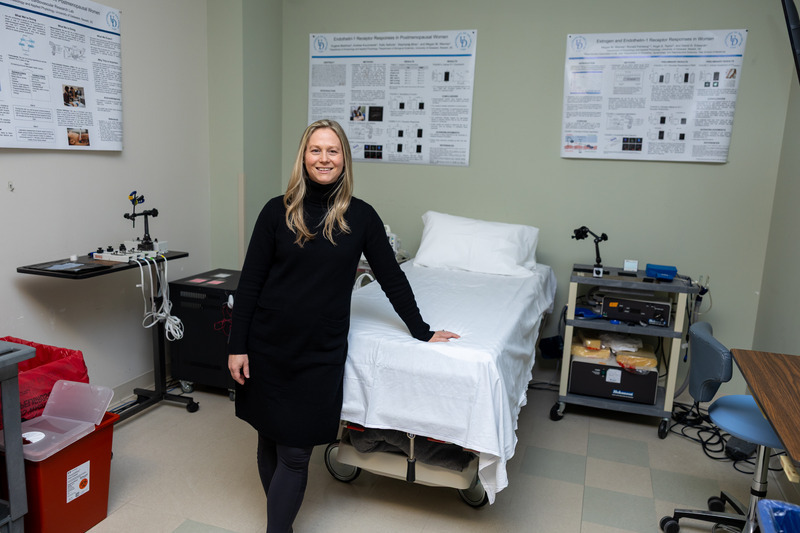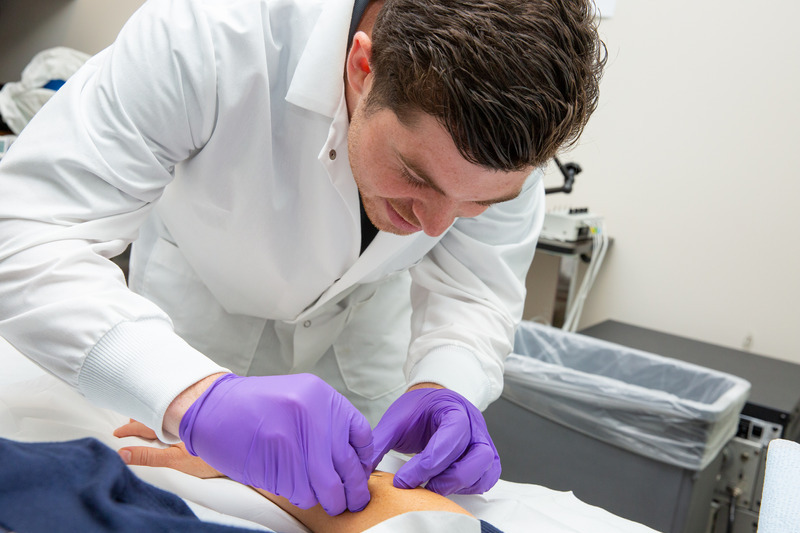


Pushing boundaries
Photos by Ashley Barnas Larrimore May 12, 2025
UD kinesiology researcher explores how overlooked hormones impact women’s heart health
Cardiovascular disease is the leading cause of death among women in the U.S. — yet women remain underdiagnosed and undertreated, in part because existing treatments still don't fully account for how women’s bodies function. Now, research from the University of Delaware is helping change that by identifying overlooked hormones that play a critical role in women’s heart health and vascular function.
While estrogen has long dominated the conversation, a new study by Megan Wenner, associate professor of kinesiology and applied physiology in UD’s College of Health Sciences, points to two lesser-known players: progesterone and follicle-stimulating hormone (FSH). Her findings suggest these hormones — not estrogen — may be more influential in maintaining blood vessel function in women across a wide age range.
Supported by a $2.25 million R01 grant from the National Institutes of Health, Wenner’s research was published in the American Journal of Physiology and recently featured in The Physiologist Magazine, produced by the American Physiological Society.
“We mostly think about these hormones in terms of reproduction and pregnancy, but the receptors for these hormones are in every tissue in the body,” Wenner said. “Their primary action is in the reproductive tract, but they greatly impact many other physiological systems.”
While estrogen is the most studied hormone in research, much less is known about progesterone and FSH.
“Progesterone findings have been mixed on whether it’s beneficial or harmful and whether it negates the positive effects of estrogen,” Wenner said. “Some studies in animal models have suggested that FSH can cause a hardening of the arteries, which is intriguing. As women age and go through menopause, they’re born with all the follicles they’ll have, and they lose them over time. As estrogen production drops, FSH increases, so we need to study those effects on vasculature further.”
Wenner’s research doesn’t just push boundaries in women’s health — it’s also shaping the next generation of scientists. Among them is Shane McGinty, who recently defended his dissertation in applied physiology after working for years in Wenner’s Women's Cardiovascular Research Lab.
“Dr. Wenner is hands-on in ensuring her students develop as scientists and as people,” McGinty said. “We were interested in how the autonomic nervous system controls cardiovascular health. How that function of the nervous system changes during menopause is fascinating.”

A passion for women’s health
Wenner, who received the UD Faculty Senate’s 2023 Mid-Career Excellence in Scholarship Award, has long been passionate about women’s health. Her interest began as a UD graduate student when the landmark Women’s Health Initiative was released in 2002. The report found that hormone therapy (HT) was tied to increased risk for stroke and heart disease in women.
“Subsequent studies have debunked this and shown that when used properly, hormone therapy is safe and effective in treating and managing the symptoms of menopause, including hot flashes,” Wenner said. “The pendulum is still swinging back from that report 23 years ago, and acceptance has been slow. A lot of education and awareness still needs to happen.”
That sparked her interest in exploring the connection between menopause and increases in cardiovascular disease, weight gain, diabetes and high cholesterol. A deeper understanding of sex-specific differences could lead to enhanced personalized medicine.
“We’re just starting to scratch the surface on these sex-specific differences and understanding the causes and mechanisms,” Wenner said. “We know the pathology of men and women is different, so we need to develop therapeutics that target the disease specifically for women.”
Research shows that HT may be most beneficial in the early years of menopause. Still, Wenner wants to study HT during perimenopause, the transition period before menopause, which typically starts in women in their mid-to-late 40s.
“We’re really interested in whether the cardiovascular benefits of hormone therapy work even earlier,” Wenner said. “Menopause guidelines for hormone therapy state that it’s very effective in relieving menopause symptoms, and it helps prevent osteoporosis, but there’s not enough evidence to show it can be used as primary prevention for cardiovascular disease.”
By targeting women in perimenopause, Wenner aims to ease the transition into menopause. Her work is also part of a growing effort to bridge the gap in understanding the differences in cardiovascular disease between men and women — and ultimately, save more women’s lives.
“We’re very interested in the trajectory of menopause and whether we can offset that trajectory,” Wenner said. “We can better design interventions that support women through these age-related health changes.”
Contact Us
Have a UDaily story idea?
Contact us at ocm@udel.edu
Members of the press
Contact us at mediarelations@udel.edu or visit the Media Relations website

